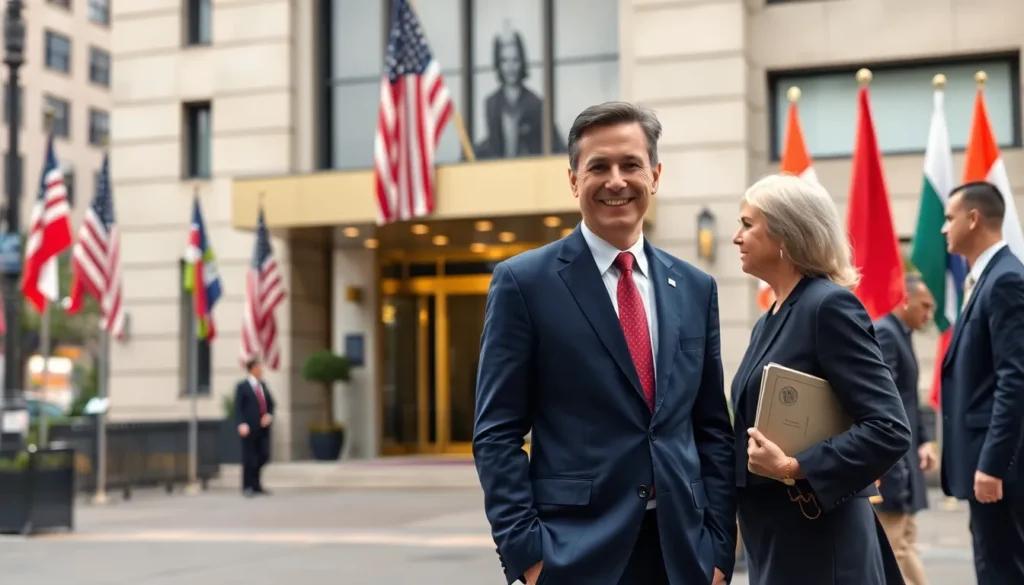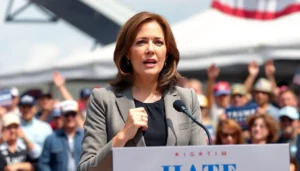Diplomatic missions play a crucial role in maintaining international relations and fostering cooperation between nations. These missions, often embodied in embassies and consulates, serve as the frontline for diplomacy, facilitating communication and negotiation on a wide array of issues. They are essential in promoting peace, security, and mutual understanding among countries.
In an increasingly interconnected world, the importance of effective diplomatic missions cannot be overstated. They not only represent a nation’s interests abroad but also provide vital services to citizens living or traveling overseas. Understanding the intricacies of diplomatic missions sheds light on how countries navigate complex global challenges and build lasting partnerships.
Table of Contents
ToggleUnderstanding Diplomatic Missions
Diplomatic missions serve as essential structures for international communication, negotiation, and representation. Their presence signifies commitment to fostering alliance and cooperation on a global scale.
Definition and Purpose
Diplomatic missions consist of entities such as embassies and consulates established by countries abroad to manage their foreign relations. These missions focus on protecting national interests, facilitating dialogue, and providing support for citizens overseas. Key functions include engaging in political discussions, gathering information about local conditions, and offering assistance in emergencies, illustrating their importance in international diplomacy.
Types of Diplomatic Missions
- Embassies: Embassies represent a nation’s government and serve as the primary diplomatic office in a foreign country. They handle high-level diplomatic activities, strategic negotiations, and bilateral relations.
- Consulates: Consulates provide services for citizens, including passport issuance and legal aid. They might also promote trade and cultural exchanges, functioning in major cities without full embassies.
- Permanent Missions: Permanent missions operate at the United Nations and other international organizations. They focus on multilateral diplomacy and represent their country’s interests on various global issues.
- Special Missions: Special missions are temporary and assigned for specific purposes, such as negotiations or peacekeeping efforts. They may consist of experts and diplomats focused on resolving particular conflicts or tasks.
- Honorary Consulates: Honorary consulates, staffed by local citizens, perform limited consular functions. They assist in strengthening ties and fostering cooperation without full diplomatic status.
These types of missions collectively contribute to a nation’s ability to navigate complex international landscapes, ensuring effective diplomatic engagement.
Functions of Diplomatic Missions

Diplomatic missions perform several essential functions that facilitate international relations and uphold national interests. Two primary functions include representation and the protection of citizens abroad.
Representation
Representation serves as a core function of diplomatic missions. They act as official representatives of their home country, engaging in negotiations and dialogues with foreign governments. Missions advocate for national policies and interests, ensuring that their country’s voice is heard in international discussions. Diplomatic missions also work to promote cultural exchanges and strengthen bilateral relations through various initiatives, including trade agreements and cooperative projects. By establishing and maintaining these connections, missions enhance a nation’s standing on the global stage.
Protection of Citizens
Protection of citizens marks another crucial responsibility of diplomatic missions. They provide assistance to nationals in distress, including aid during emergencies such as natural disasters, political unrest, or medical crises. Missions offer services including passport renewal, legal guidance, and consular support. They also monitor the welfare of citizens residing or traveling abroad, ensuring their rights are safeguarded under local laws. By prioritizing citizens’ safety and well-being, diplomatic missions reinforce the trust and confidence that nationals place in their government when abroad.
The Structure of Diplomatic Missions
Diplomatic missions consist of several components that work together to facilitate international relations. Key elements include diplomatic staff and support services, both of which play crucial roles in mission operations.
Diplomatic Staff
Diplomatic staff form the backbone of any diplomatic mission. They represent their home country and handle various aspects of diplomacy. Key positions within the staff include:
- Ambassadors: Lead diplomatic missions and serve as the primary representatives.
- Counselors: Assist ambassadors in high-level negotiations and policy discussions.
- Attachés: Focus on specific areas, such as economic, political, or cultural matters.
- Consul officers: Implement consular services, aiding citizens and handling local matters.
Staff members often undergo specialized training in international relations, law, and languages, enhancing their ability to navigate complex diplomatic situations. Their combined expertise fosters effective communication, negotiation, and representation of national interests abroad.
Support Services
Support services enhance the functionality of diplomatic missions through essential administrative and logistical support. Key areas of support include:
- Administrative Services: Manage day-to-day operations, ensuring efficient communication and documentation.
- Security Teams: Provide protection for staff and facilities, safeguarding them against potential threats.
- Public Affairs Offices: Handle media relations, promote cultural programs, and inform locals about the mission’s activities.
- Legal and Financial Aid: Offer assistance with legal issues and financial transactions for citizens and businesses.
These support services optimize mission operations, ensuring diplomats can focus on their primary functions and strengthen the nation’s international presence.
Challenges Faced by Diplomatic Missions
Diplomatic missions encounter several significant challenges that can hinder their effectiveness in promoting national interests abroad. Among these are political obstacles and security concerns.
Political Obstacles
Political obstacles often arise from changing international dynamics, including strained bilateral relations and shifts in domestic policies. These challenges can impede open dialogue and negotiation efforts between nations. In regions with political instability, diplomatic missions face heightened difficulties in engaging local governments. Often, missions must navigate complex bureaucracies and respond to unforeseen political events, such as elections or protests. Additionally, opposition from local political factions may obstruct collaboration, making it essential for diplomats to adapt strategies continually. Successful diplomatic missions remain agile, leveraging cultural understanding and local alliances to mitigate these political hurdles.
Security Concerns
Security concerns represent another critical challenge for diplomatic missions. Threats arise from various sources, including terrorism, civil unrest, and espionage. Diplomatic agents often operate in volatile environments, which can necessitate heightened security protocols to safeguard personnel and facilities. Missions implement measures such as fortified premises, secure communication systems, and constant risk assessments to counter these threats. Furthermore, the safety of national citizens abroad becomes paramount during crises, requiring efficient coordination with local authorities and external agencies. Addressing security challenges directly impacts a mission’s ability to fulfill its functions effectively, underscoring the importance of robust security strategies in diplomatic operations.
Diplomatic missions are indispensable in shaping global interactions and fostering international cooperation. They not only represent national interests but also serve as vital support systems for citizens abroad. The intricate balance of diplomacy requires skilled personnel who navigate complex political landscapes and address security challenges.
As nations continue to face evolving global issues, the significance of these missions will only grow. Their ability to adapt and respond to changing circumstances ensures that they remain effective in promoting peace and understanding. Ultimately, diplomatic missions are key players in the quest for a more connected and harmonious world.





